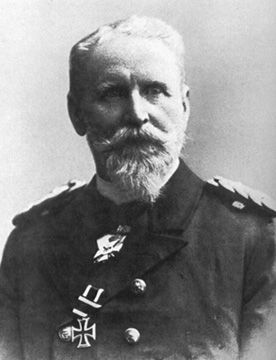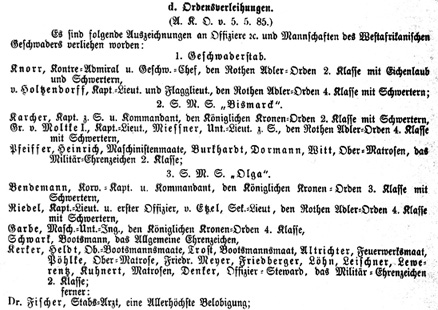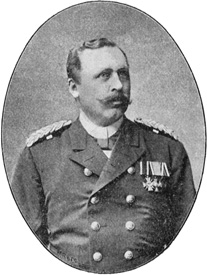|
Markus Bodeux
In the beginning of 1884 more and
more complains came up regarding black tribe members
attacking the German population. The chiefs were bribed
by the other colonial forces, seeing their power
decreasing, to break the old contracts with Germany.
Therefore the "Reichsregierung" German senate took the
colony Kamerun under the protection of the German Reich.
Issued on September 27, 1884, the so called "Westafrikanische
Geschwader" (West African Squadron) was formed and set
under power of Admiral Eduard Knorr.
Eduard von
Knorr
8.3.1840 –17.2.1920
Received his tittle
by Army Order January 18, 1896. June 15, 1898, he
was awarded the Order of the Black Eagle.
On the picture he is
wearing the Iron Cross 2nd class, that he was
awarded being the commander of the gun boat "Kanonenbootes
METEOR" for the fight with the France boat "Aviso
BOUVET" at Havana. He is also wearing the Red Eagle
Order that he was awarded for the duty in Kamerun
1884 (He got the crown for this order June 24,
1894). |
 |
The order Eduard von Knorr
received from the Kaiser enables him to use military
force:
"......should there be a
violation of German rights of persons implemented by
tribes in Kamerun or Kamerun coastal areas, you have
to solve these problems. If this isn't possible on a
peaceful way, you have to use military force."
On the other hand the Kaiser was
aware of the problems that could result using military
forces in an area of common interest of the other
colonial countries:
".......always try to not get
into conflicts with ships of the other European
Nations. If you get involved, try to get out if in a
peaceful and passive way."
The ships left Wilhelmshaven
Germany October 30, 1884. The squadron was set together
of Kreuzerfregatten BISMARCK, Knorrs Flaggschiff, and
GNEISENAU, as well as Kreuzerkorvetten OLGA and ARIADNE.
In Porto Grande on the "kapverdischen" islands the
GNEISENAU and ARIADNE was redirected to fulfill
different orders.
BISMARCK and OLGA reached the
African coast the beginning of December and stopped
December 17 in the delta of the Kamerun river. December
20 the landing corps was shipped to the land, while OLGA
went up the river to take some tribe villages under
artillery fire.
The corps, 18 officers, 2 medical doctors and 287
soldiers, were able to beat the revolting tribe members
and pushed them back into the forests.
The following night, December 21, most of the revolting
leaders were arrested. The Germans had one total los of
men and 8 wounded.
Admiral Knorr implemented a barricade on the coastal
line. The piece was brought back and the German settlers
were protected.
While Admiral Knorr was send of
for other challenges in the Pacific Ocean, the OLGA went
back into Kiel, Germany, May 25, 1885.
The Kaiser was so impressed with
their military work, that he ordered one NCO (Obermaat)
and 8 soldiers to Berlin to honor them on June 1885 in
front of the Berlin's chateau. They were the first
members of the Imperial German Navy that experienced
this honor.
|

S.M.S. OLGA |
Already before their arrival in
Kiel, Germany, the members the so called "Westafrikanische
Geschwader" (West African Squadron) were awarded the
following orders and medals within order from May 5,
1885 for their merit:
|

Marineverordnungsblatt 1885, Nr. 10,
S. 99 |
|

Korvettenkapitän
Louis Riedel, s. Zt. 1. Offizier S.M.S. OLGA,
wearing the Red Eagle Order 4th class with swords |
Furthermore the Korvettenkapitän
Bendemann was awarded with the Commanders Cross 2nd
class with swords, the Leutnant zur See von Hoepner and
the Unterleutnant zur See von Ernsthausen the knights
cross 1st class with swords of the Kings Württemberg
Frederick Order. (A.K.O. vom 18. Juli 1885)
June 4, 1885, it was stated that
the time in Kamerun would be counted as war time and
therefor counted towards retirement:
„.........Für den Stab des
Westafrikanischen Geschwaders und die Besatzungen
Meiner Kreuzerfregatte „Bismarck“ und Meiner
Kreuzerkorvette „Olga“ ist die im Dezember des Jahres
1884 ausgeführte militärische Aktion in und bei
Kamerun als ein Feldzug im Sinne des §.23 des Gesetzes,
betreffend die Pensionierung und Versorgung der
Militärpersonen des Reichsheeres und der Kaiserlichen
Marine vom 27. Juni 1871, anzusehen.“
 Bar KAMERUN 1884 for the Colonial
Commemorative Medal
Bar KAMERUN 1884 for the Colonial
Commemorative Medal |
In its issue document the bar for
KAMERUN 1884 is stated. The crew of the ships BISMARCK
and OLGA, contained approx. 690 soldiers, including the
following officers, Navy Engineers and Navy doctors:
Bachmann Unterleutnant zur See
BISMARCK
Bartz Marinezahlmeister BISMARCK
Basse, von Leutnant zur See OLGA
Bendemann Korvettenkapitän OLGA, Kommandant
Bethge Kapitänleutnant OLGA
Bugge, Dr. Marinestabsarzt BISMARCK
Buschmann Maschinenunteringenieur OLGA
Dammann, Dr. Marineassistenzarzt 2. Kl. BISMARCK
Ernsthausen, von Unterleutnant zur See OLGA
Etzel, von Secondelieutenant OLGA, kdt. vom
Seebataillon
Fischer, Dr. Marinestabsarzt OLGA
Garbe Maschinenunteringenieur OLGA
Gildemeister Leutnant zur See OLGA
Gotzhein Seekadett OLGA
Hoffmann Unterleutnant zur See OLGA
Holtzendorff, von Leutnant zur See Westafrikanisches
Geschwader, Flaggleutnant
Höpner Leutnant zur See OLGA
Karcher Kapitän zur See BISMARCK, Kommandant
Kölle Unterleutnant zur See BISMARCK
Knorr Konteradmiral Westafrikanischer Geschwader,
Chef
Meier III. Unterleutnant zur See BISMARCK
Meyer II. Leutnant zur See BISMARCK
Mießner Unterleutnant zur See BISMARCK
Moltke, Graf von I. Leutnant zur See BISMARCK
Riedel Kapitänleutnant OLGA, 1. Offizier
Roeske Maschinenunteringenieur BISMARCK
Scheer Unterleutnant zur See BISMARCK
Schmidt II. Unterzahlmeister OLGA
Schnars Leutnant zur See BISMARCK
Stiege Leutnant zur See BISMARCK
Wilm Kapitänleutnant BISMARCK, 1. Offizier
© A. Schulze Ising, I/00 |





